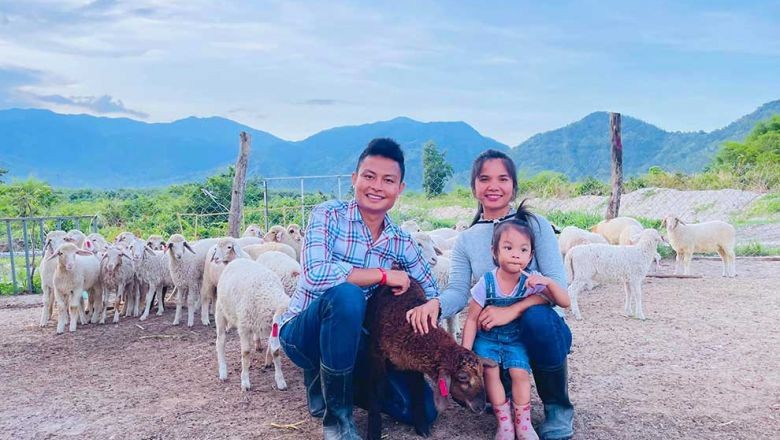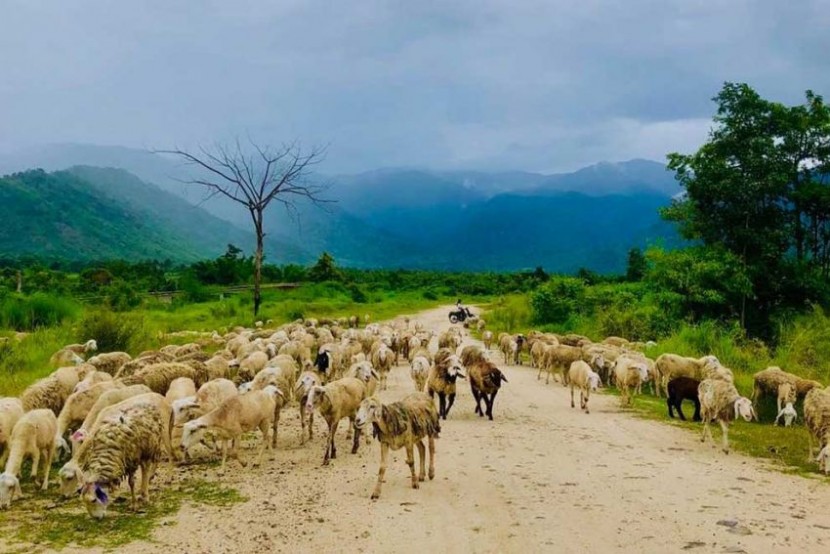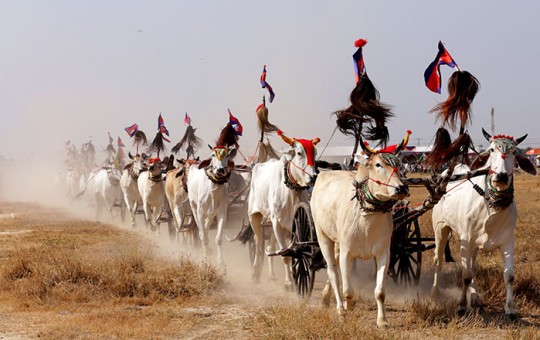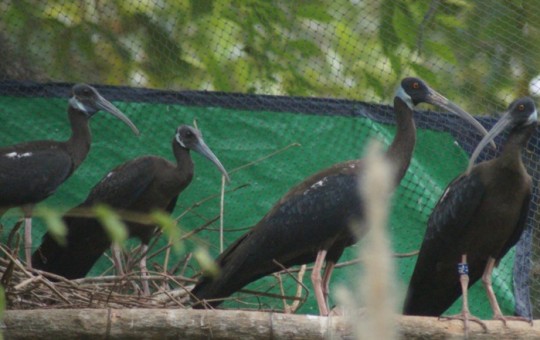
Tourists flock to mountain sheep farm for picture perfect scenery
Kampong Chhnang is home to a very lucky flock of sheep that are able to spend their days peacefully ambling about a verdant green field that is surrounded by beautiful Oral mountain scenery, providing the sheep with stunning views in every direction.
Of course, the sheep take little notice of anything other than the grass they munch all day, but there’s an abundance of it as well as peace and quiet, and the combination makes it a paradise for them.
The field and its resident flock are owned by Organic Sheep Farm and are located in Khvit Tuol Khlaing village of Kbal Teuk commune in Kampong Chhnang province’s Teuk Phos district near the Oral mountain range area bordering Kampong Speu province, roughly 110km from Phnom Penh.
The beauty of this idyllic and pastoral setting may not impress the flock of sheep much, but people definitely love it. The location has become a romantic spot for couples and selfie central for tourists, who like to snap photos of themselves standing amid hundreds of adorable grazing sheep.
The amount of interest from visitors has become so great that the farm’s owner, Bun Chan Virak, turned it into a side business. He recently announced the addition of wedding photography packages for couples starting at $100, among other tourism focused initiatives.
“Originally, my father and I planned to use the land there for growing crops because we bought about 10ha and it was next to a stream flowing from a waterfall,” the 27-year-old farmer turned entrepreneur told The Post.
“I also thought it might be nice to build a resort there, but then the Covid-19 pandemic started and those plans had to be put on hold, so we focused on agriculture,” he said.
Organic origins
Virak graduated from high school and afterwards he went abroad and studied agriculture, an opportunity that came to him because of his involvement with programmes operated by Christian groups run by foreigners.
“I went to study abroad and they had very good teachers there and I learned a lot from them. After my studies were finished, I invited some of them to come to Cambodia and visit my farm, and while they were here they taught me further lessons on animal raising as well as producing fertiliser,” he said.
Chan Virak said his education abroad taught him the value of keeping up to date on the latest knowledge and techniques in agriculture, so he continues to do online study and research of these topics on his own.
He noted that at first he began using 5ha of his land to plant 2,000 coconut trees and another 3ha to grow a variety of other crops.
“Some crops can take three years to reach maturity; some can even take four or five years to be ready to be harvested. Right now I’ve got some crops that were just planted and some that have been growing for three years and nearing harvest time,” he said.
Chan Virak was able to gradually expand his farmland to incorporate hundreds of hectares, but he’s only making use of 50 of them currently.
Though he was born in Phnom Penh, Chan Virak moved to Kampong Chhnang more than seven years ago.
“We were growing crops and raise animals to supply our own household needs, and we decided it was a good business and that if we expanded and got bigger we’d be able to sell the extra produce,” he said.
Currently Virak raises about 1,000 sheep and 40-some goats for their milk along with organic pigs, ducks, chickens, quail, rabbits and he even raises earthworms at his farm.
In the past, the farm could not afford to supply to the shops that contacted him due to their limited production capacity, but for the past few months Virak has been able to sell lambs, pigs and some crops such as bananas blossoms and coconuts.
Profits from the flock of sheep are used to invest in his many other pilot investments like the goat milk and the earthworms as well as growing mixed crops and making natural fertiliser.
“We spent tens of thousands of dollars on all these new projects,” Virak said.
Organic boosts health
Virak insists that everyone in the agricultural sector and all farmers who produce agricultural products for consumption by the general public by supplying the markets should care about consumer’s health besides focusing on income.
“We should look for ways to make the agricultural sector safer and healthier with natural produce and not just think of ourselves and our own families, we need to think about other people as well,” said Virak.
Virak explained that just like the use of pesticides and other chemicals in farming were dangerous for consumers, so too were the overuse of antibiotics and hormones in animals in terms of affecting human health.
“When these things are consumed it makes the body resistant to antibiotics, so when they fall sick and they take those medicines they are less effective. Some people who have consumed too much hormones have suffered alterations to things like sexual behaviour or mood. People can really be harmed badly by some of these substances being put in their food,” he said.
However, he said he considers his farming to be “natural practice” farming rather than organic farming per se.
“To call our products organic we need certification from an outside organisation. So what do I do? I don’t want to be pressured by any institution about how to run my business, though I think that if I applied for it I would receive the certification, but for many other farmers passing the certification requirements would not be so easy,” he said.
For example, he said that crops that are grown without the use of any chemical substances like pesticides could still be affected by their use on neighbouring plantations if the wind blows the wrong way.
He said that using natural agriculture methods that focus on safety and health was sometimes financially challenging, but he was able to get assistance from the Kampong Chhnang provincial governor.
“I used to have financial problems and he contacted me and he found a financial institution to give me a loan so I could stay in business, but beyond that he has really helped me a lot himself personally. He even held a press conference saying that the lamb and goat milks that the province would one day be famous for the lamb and goat milk I produce,” he said.
Tourist farms take off
With his farm set-up finished and done and his fields yielding more crops each season than he could find workers to harvest, Virak decided it was time to start attracting tourists.
Virak’s single hectare of 200 mixed crops is part of his plan to turn the farm into an agro-tourism zone in the future.
“I want to transform my business into an agro-tourism resort, so when people visit they can learn about crops and raising animals. We’ll also arrange for their accommodations, and while here they get to eat wonderful meals cooked with farm fresh ingredients that they’ll know are really what they claim to be because they’ll be able to harvest them personally,” he said.
According to Virak, everyone who visits his farm loves the scenery and his flock of sheep and their paradise of a pasture and he plans to open further to the public soon.
“There are many people who want to come, especially people are very interested in petting the sheep. I think based on my current situation I can also welcome tourists now, but my dad thinks differently and said wait until we are very well-prepared first so that when they come we know that all of them will be totally satisfied,” said Virak.
Minister of Tourism Thong Khon has noted in the past that “establishing agro-tourism areas has the potential to make a huge contribution to encouraging tourists to visit the country”.
Chuk Chumnor, director of the Department of Tourism’s product development division and spokesman for the tourism ministry, said agro-tourism creates a link between agriculture and tourism and can easily be established at any functioning farm with the resources to invest in the required infrastructure or facilities.
“The farmers growing fruit on their plantations are the sort of places that would be perfect for tourists and some famers who already have well-developed plantations just need to build a restaurant or guesthouse or make the grounds more attractive and they are ready to open,” he said.
Besides boosting agriculture and the community’s economy, agro-tourism is also becoming a popular trend for domestic tourists vacationing within Cambodia.
Although there are no exact figures on the number of agro-tourism destinations, the director was very enthusiastic about the concept and its future prospects.
“We have to study this sector further to get precise numbers, but we can definitely say that agro-tourism is increasing,” he said.





